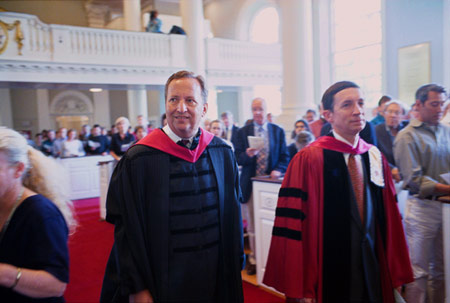Summers addresses Divinity School
Welcomes Dean Graham, outlines upcoming challenges

Harvard President Lawrence H. Summers welcomed the incoming class of the Harvard Divinity School (HDS) at its convocation Wednesday (Sept. 18), reinforcing the importance of the School’s mission and offering his support to the School in meeting key challenges.
“Contrary to widespread predictions in the last century religious belief and practice are flourishing in this country and around the world,” Summers said. “It is therefore essential that a great university address religious issues – in scholarship, in teaching, and in the public domain – with rigor and imagination.”
The School’s 187th Convocation, in the Memorial Church, was William A. Graham’s first as dean of the School; he was appointed dean by Summers in August after serving as acting dean since January 2002. Graham, Murray A. Albertson Professor of Middle Eastern Studies in the Faculty of Arts and Sciences, has served on Harvard’s faculty since 1973.
Introducing Summers, Graham lauded the president’s extensive engagement with the School during the yearlong search for a new dean.
“He immersed himself like none before him, with the possible exception of Nathan Pusey, in the issues facing Harvard Divinity School and the study of religion at Harvard,” said Graham.
Summers admitted that his own experience, personal and professional, with the divine was limited. “Of all Harvard schools, I approach Divinity with the greatest trepidation,” he said, drawing chuckles for his acknowledgement of the School’s “special connections.”
Yet his remarks and very specific suggestions made clear his deep involvement in the School over the past year’s search for a new dean.
While some of the issues the School faces are shared by Harvard’s other professional schools – balancing the training of practitioners with cutting-edge research, establishing a core of knowledge shared by all in the field – some dilemmas are unique to the Divinity School, he suggested.
“In what ways should Christianity be privileged and not be privileged, recognizing the School’s traditions, strengths, and need for focus, and also taking into account growing religious pluralism?” Summers queried.
“How, within the study of Christianity, and within the preparation of Christian ministers, should we adapt to the dramatic changes taking place in denominational affiliations within the United States” and beyond its borders, he continued.
He called for the Divinity School faculty and community to work toward a unified perspective on these questions in the next few years.
Renewing faculty and curriculum
Summers continued by outlining four specific areas that he and others on the faculty identified as the School’s most pressing concerns: faculty renewal, curricular revision, connections within the University, and connection to religious practice.
In recruiting new faculty over the next five years, he said, “it will be crucial to resist narrowness and parochialism in defining fields, so that we can take advantage of new intellectual currents and attract those who will do their most creative work at Harvard.”
The School’s curriculum, last reviewed in the early 1980s, should be revised, Summers said, to reflect the diverse needs of students preparing for the ministry and those preparing for scholarship or other religious leadership.
While Christianity should continue to occupy a central place, he added, the school’s curriculum should also embrace the critical study of many other religious traditions.
Summers opened his speech with a droll account of the relationships of Harvard’s past presidents to the Divinity School, as related to him in a letter from the Rev. Peter J. Gomes, Plummer Professor of Christian Morals and Pusey Minister in the Memorial Church. Gomes, a scholar of Harvard history, maintains that Harvard’s President Eliot “reinvented” the School, that Lowell merely “tolerated” it, and that Conant moved between hostility and indifference, even scheduling his dean’s meetings for 11 o’clock Sunday mornings, when the Divinity School’s Dean Sperry was required to preside at the Sunday service.
“I will count myself a success,” Summers concluded, “if Peter Gomes can one day say of me that I challenged and supported the Divinity School.”
The convocation, robustly attended by faculty members and current and new students, welcomed 164 candidates for the degrees of Master of Theological Studies (M.T.S.), Master of Divinity (M.Div.), Master of Theology (Th.M.), and Doctorate of Theology (Th.D).
“It’s nice to hear him say that he’s interested in paying a little more attention to people going into the ministry,” said Amy Sens, M.Div. ’03, who plans to become a minister in the United Church of Christ. Recalling Gomes’ letter, she said, “I’m interested to see what moniker he gets when he’s gone.”




